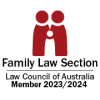Beware of the Perils of Self-Representation

Some years back Brad and Jane separated. There were two very young children of the marriage. Jane had been the primary carer, while Brad assumed the role of financial provider. When the couple parted, they did so amicably. They managed to organise time with the children and their day-to-day finances informally. Jane stayed in the family home with the children and Brad found accommodation nearby. They remained good friends and regularly attended the children’s school events and activities together.
Things started to unravel when Brad started seeing a work colleague. Tensions surfaced between them, signaling the need for formal arrangements. Since their relationship had been amicable and they could compromise, they chose self-representation. They agreed that only Jane would instruct a lawyer and so, consent orders were drafted.
The parenting aspect provided for high frequency change overs, while the financial aspect imposed an unusual and onerous spousal maintenance clause. Because Brad had no legal advice, he signed them without seeking any changes.
This decision has cost him dearly, both financially and emotionally. He has since sought legal advice and has spent years trying to alter the original orders and replace them with something more reasonable. The lesson – all of this could have been avoided if he had instructed a lawyer in the first place.
The reasons people choose self-representation are varied.
Aside from cost, other reasons include:
- Time – parties may want their issues dealt with quickly and they may think that using a lawyer will slow down the process;
- Emotion – the parties may have a very amicable connection and believe that legal representation could aggravate or sour the relationship;
- Power Imbalance – nature of the relationship may be that one person has assumed a more dominant role which makes it difficult for the other person to assert their needs;
- Trust– One party might deeply trust the other, and even without ill intent, the breakup involving children and finances remains sensitive and complex. Navigating these issues can be challenging. At times people believe that they are the best person to present their case i.e. self-representation.
As the story of Jane and Brad reveals, family law is an emotional and complicated area of law, added to that is the fact that circumstances do change. What may work today, may not work in two, five or ten years. The advice from a trained objective practitioner may sometimes seem unnecessary in the short-term. However, in the long-term it provides a certainty and reassurance that many people find invaluable.
This post is an overview only and should not be considered as legal advice. If there are any matters that you would like us to advise you on, then please contact our office directly on 02 9948 3820.








